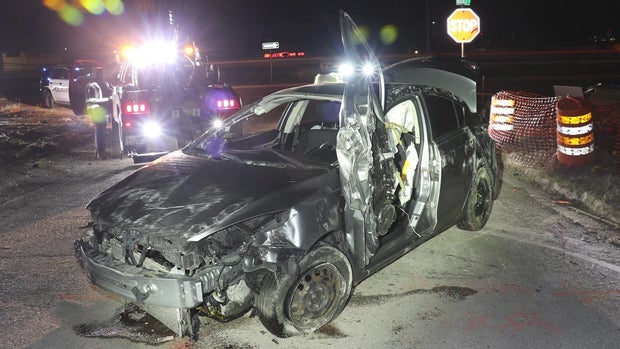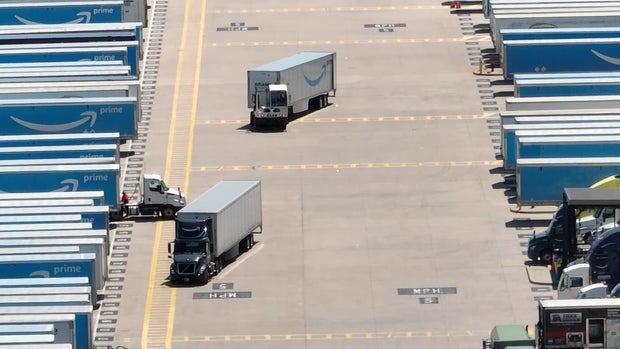Amazon trucking contractors have higher rates of safety violations, CBS News investigation finds
The death of a 19-year-old college student on a Texas highway is raising questions about the fleet of drivers Amazon uses to move packages between its facilities. College freshman Iliana Velez’s life was cut short in a crash with a contractor who was driving to pick up an Amazon load.
A University of Texas freshman, Velez was working nights sorting packages part time at an Amazon fulfillment center.
In the early morning hours of Jan. 3, 2022, Velez was on a break when she was forced off the road by a box truck driven by Jordan Sannicola, a contractor on his way to pick up an Amazon shipment. Velez’s car rolled multiple times. She died at the scene.
CBS News
Her mother, Trula Velez, received the news from police that same evening.
“The officer knocked on my door and he said that she was involved in an accident, and she didn’t make it,” she said. “I was such in a state of shock.”
When Sannicola was arrested four weeks later, investigators learned he had a history of traffic violations, a suspended driver’s license and outstanding felony warrants, including one count of evading arrest with a vehicle. He told police he was using a hand-held mobile device when he collided with Iliana Velez’s car.
“Someone with multiple warrants should not have been hired,” Trula Velez said.
San Marcos Police Department
A lawsuit filed by Trula Velez alleges Amazon had previously rejected Sannicola’s application to deliver packages for the company’s “flex” home delivery service after he failed a background check. Still, he was able to drive for an Amazon-contracted company. Despite his criminal history and driving record, Take Flight with B, a North Carolina motor carrier company, hired Sannicola to move Amazon freight.
Missed warning signs?
The Velez family attorney, Alex Hilliard, claims that because of the background check, Amazon was “fully aware” of Sannicola’s poor driving record and criminal background when he started driving for Take Flight, which transported goods between Amazon facilities on a segment of the delivery network known as the “middle mile.”
The lawsuit also alleges tracking technology provided by the Relay phone application Amazon uses to monitor driver location and performance had informed the company of Sannicola’s unsafe driving behavior, but it failed to act.
“Mr. Sannicola had 70 different speeding violations [while working for Take Flight] that Amazon had been notified of,” said Hilliard. “They did nothing about that.”
A CBS News analysis of federal safety data revealed Amazon contractors primarily in the company’s “middle-mile” delivery network had monthly violation rates — such as speeding and texting while driving — that were usually double those of carriers who didn’t transport for Amazon. The analysis examined six years of monthly Federal Motor Carrier Safety Administration (FMCSA) unsafe driving rates and found the average rates of carriers who shipped for Amazon were at least 89% higher in every month.
“I was stunned,” said Jason Miller, a professor at Michigan State University who is an expert in supply chain management. “I’ve published many articles using these data. You do not see effects like this normally, where you have a set of carriers that is almost twice as unsafe as a different set of carriers.”
CBS News used roadside inspection reports in federal data to identify Amazon contractors. The reports, which are produced by law enforcement, indicate who a carrier said they were shipping for at the time of inspection. The analysis included carriers who shipped at least once for Amazon in the two years leading up to each month examined.
Miller said the large patchwork of contractors Amazon uses for “middle-mile” transport poses challenges to ensuring a uniform culture of safety.
“The more you are essentially having your freight hauled by hundreds, if not thousands of small young firms, that makes it much more difficult to ensure those firms are operating safely versus a more – what we call strategic procurement model, where you may have a few very large carriers that you work with that handle a lot of freight,” said Miller.
In the past two years, at least 57 people have died in more than four dozen crashes involving federally regulated carriers shipping for Amazon, according to FMCSA data, though the data does not indicate who was at fault in these incidents. The FMCSA produces a crash involvement score for carriers, but it is not public.
Amazon’s response
“Any fatality is heartbreaking,” said Tim Goodman, Amazon’s global legal director for road safety. “Any families that have been affected by this all have our condolences and our hearts go out to them.”
While Amazon mandates background checks for contracted drivers who deliver directly to customers’ homes, Goodman said the company looks to the FMCSA to oversee “middle-mile” contractors who move freight between facilities in larger vehicles.
A spokeswoman for FMCSA confirmed it requires contractors who dispatch commercial motor vehicles with a gross vehicle weight rating of more than 10,000 pounds to conduct background checks into drivers’ safety performance history as a condition of employment.
Amazon said when the company learns a contracted carrier has violated FMCSA guidelines, the carrier can face consequences, including permanent suspension.
“We have taken disciplinary action against around 19,000 motor carriers for failing to meet FMCSA safety requirements,” Goodman said.
Among those carriers is Take Flight with B, the contractor that hired Jordan Sannicola. Amazon confirmed it suspended Take Flight with B permanently from its contracted fleet. The motor carrier has since gone out of business.
Goodman defended Amazon’s continuing reliance on third-party trucking contractors to move its freight and deliver packages.
“In the United States, transportation with motor carriers is driven by independent businesses, small businesses,” said Goodman. “It has been that way since at least the Carter administration.”
“We are unique at Amazon in terms of our scale,” Goodman said. “But it’s a business model that has worked, and worked well, and we’re committed to having it be a catalyst to be able to improve safety for the roads for all of us.”
CBS News
Amazon disputes CBS News’ data findings. In a statement sent after the interview, a spokesperson said: “We’ve worked closely with CBS throughout this story, and are disappointed that they continue to use data based on a flawed methodology. We take safety incredibly seriously and the truth is that overall crash rates across third party carriers that we work with have improved. Our standards are stricter than FMCSA requirements, and we’ll continue working to ensure our partners are the safest carriers on the road.”
Among other complaints, the company took issue with how CBS News identified Amazon contractors—it said inspection reports sometimes list the wrong shipper—and how CBS News measured a carrier’s safety.
Amazon measures safety using the FMCSA’s “unsafe driving score,” which is a number that applies different standards depending on the size of the carrier. This score is not made public by the government, but the underlying data is. Rather than ranking the carriers by size, CBS News looked directly at the underlying rates of unsafe driving violations like texting and speeding.
CBS News consulted with multiple leading supply chain researchers, who all use FMCSA measures in peer-reviewed studies. Alex Scott, a University of Tennessee professor and expert in supply chain management, said he does not use the FMCSA’s scores in part because they make smaller carriers appear safer than they are.
“I don’t think that makes any sense,” Scott said. “If they’re less safe, then they’re less safe.”
What the court system says
On Oct. 11, a judge sentenced Jordan Sannicola to a 40-year prison term for the charge of “failing to stop and render aid — accident involving death” in the crash that killed Iliana Velez.
San Marcos Police Department
“One mistake cost someone’s life, and that was my daughter’s, and her life was just getting started,” Trula Valez said.
A court date for her lawsuit against Amazon is set for early 2025.









